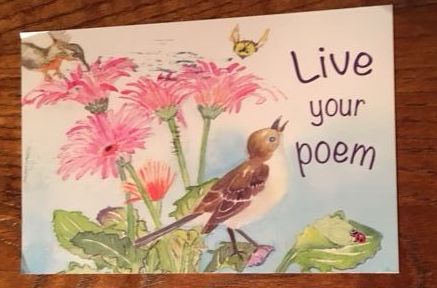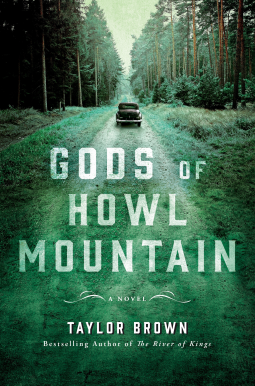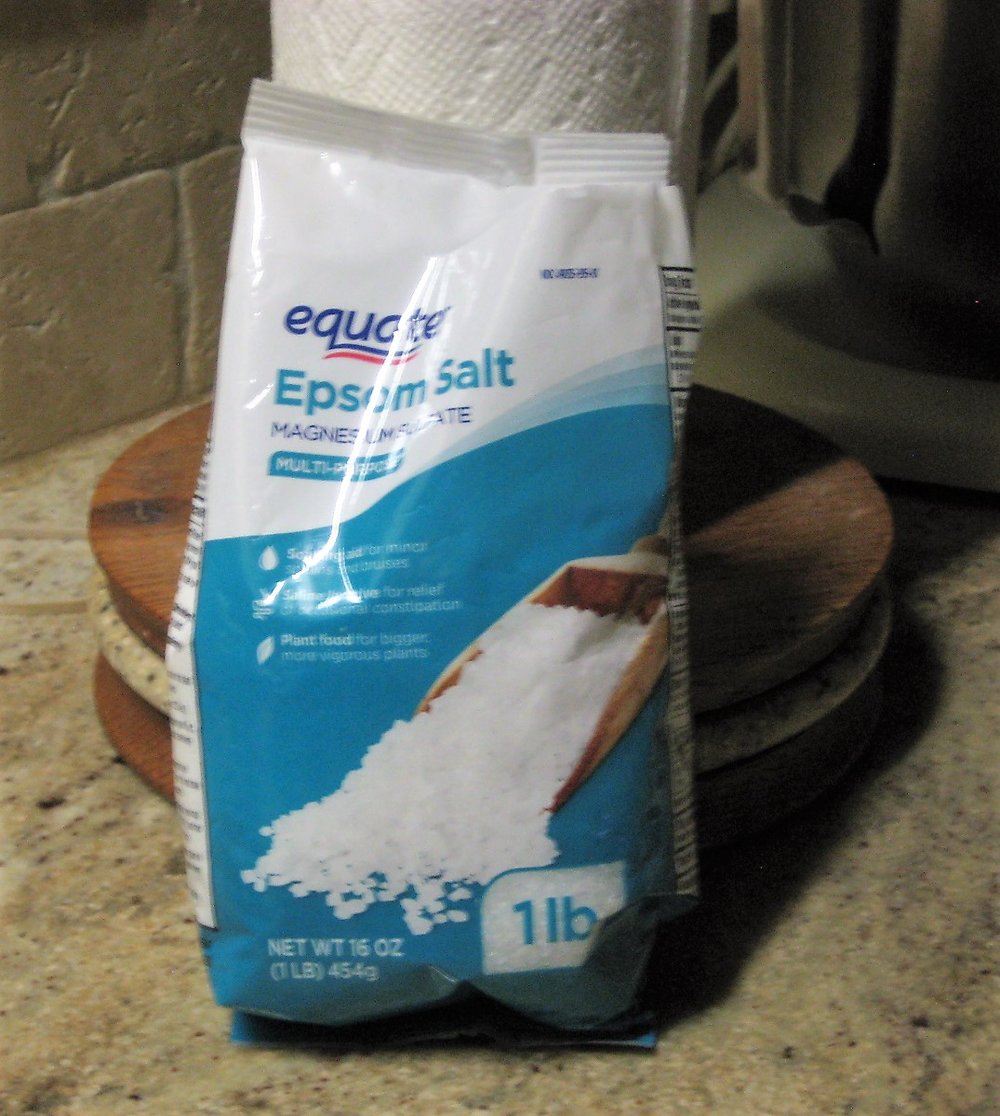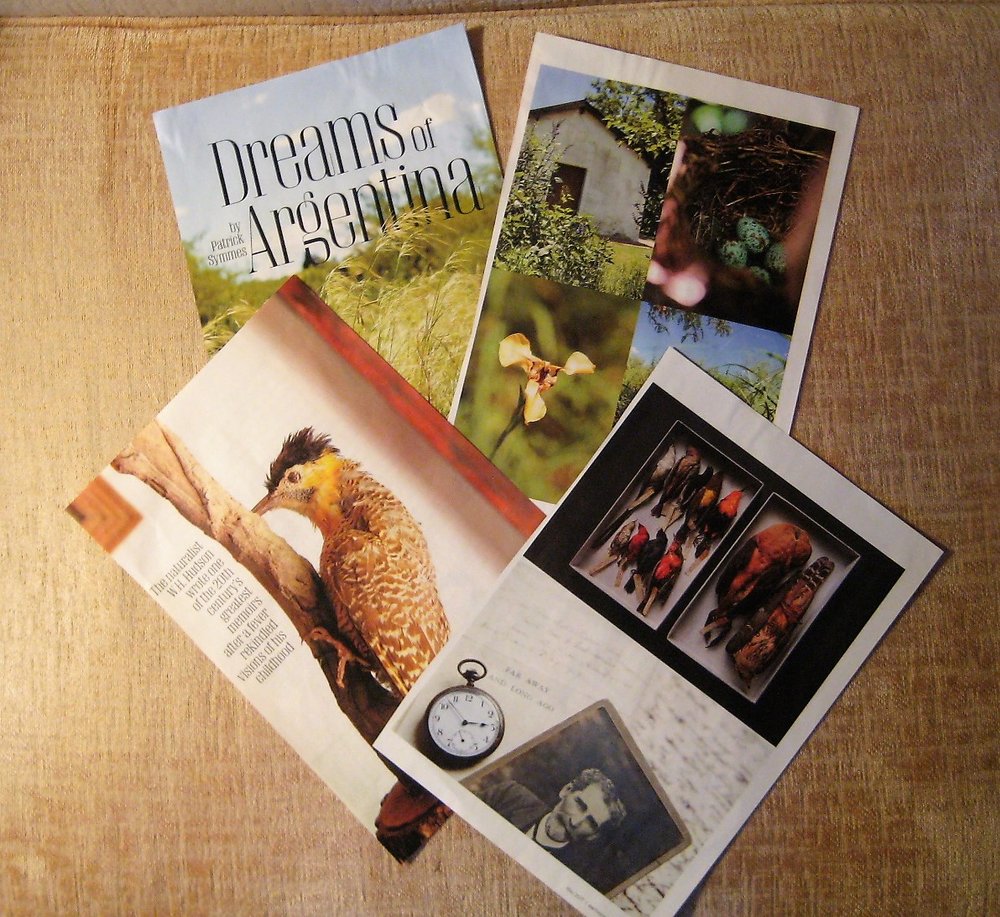If I may alter a phrase from Forrest Gump’s mother, “Husbands are like a box of chocolates. You never know what you’re going to get.” On this sixtieth anniversary of acquiring one, I can prove my point.
The Craziest Fishing Tale on the Bayou
Remembering Richard Peck
Things to Do
Buddy, Not Bully
Running on the Roof of the World
The degree of intrigue in the title of Jess Butterworth’s novel, Running on the Roof of the World,is no match for the tale she spins. Set in Tibet where Tash must follow rules of the Chinese soldiers, problems come out into the open when a man publicly sets himself on fire to protest the occupation.
Mothers, Daughters, and Birds
Working Pajamas
Quiet
Nerd Thrills
The Neuroscientist Who Lost Her Mind
Cruel April
The Stupendously Spectacular Spelling Bee
Y'all Come!
The invitation was universal. It covered tomorrow, next week, whenever you happen to be passing; covered you, your children, your elderly parents, your crazy Aunt Martha, your weird cousin Joe; covered with or without a specific invitation. I can hear it now from the door as we left the door of country people – or they left from ours. Now, I issue my own invitation to my remodeled website.
The Sun Does Shine
Antony Ray Hinton, in a memoir of his life in prison on death row for a crime he did not commit, begins his saga in The Sun Does Not Shinewhen he was twenty-nine years old and chronicles its ups and downs for twenty-seven years. The book is co-written with Lara Love Hardin with a foreword by Bryan Stevenson, best-selling author of Just Mercy.
A bad joke doesn’t show up until over half the book is finished, but its truth is there from the beginning. Question: “What does capital punishment mean?” Answer: “It means a guy without capital gets punished.”
With enough evidence to have cleared him from the beginning, including the verification that he had clocked in at work before the crime began and clocked out after it was over in a place too far away to have made the trip, he is convicted. Adding a competent attorney to that evidence should have cleared Ray to live a normal life, but he is poor and black in Alabama.
Written in a style that gives a feel that Ray is sitting across from you at the table over a cup of coffee (or several considering its length), he takes you to his small bare cell with less than most of us would consider essentials. Recounting a story that goes through a range of emotions, surprisingly including a fair batch of humor, leaves one wondering at the resilience of the human spirit. I will not spoil his story by relating his coping mechanisms that thread through and add interest to the memoir.
I recommend the book to anyone interested in justice and to those, like me, who have wondered how a human being could survive in what amounts to a small cage with little or nothing to do.
Dreams and Plans
 I got a postcard from a writer friend reminding me that this is poetry month. I wish I had her skilled way of turning words into poems. Compared to her and other real poets, I hesitate to even consider myself a part of that community, but I’m also claiming other advice I read last week. “Just because you aren’t making progress as fast as you think you should doesn’t mean you aren’t making any progress. Keep going.” With the second in mind, I’ll share my verse that reflects my writing expedition.
I got a postcard from a writer friend reminding me that this is poetry month. I wish I had her skilled way of turning words into poems. Compared to her and other real poets, I hesitate to even consider myself a part of that community, but I’m also claiming other advice I read last week. “Just because you aren’t making progress as fast as you think you should doesn’t mean you aren’t making any progress. Keep going.” With the second in mind, I’ll share my verse that reflects my writing expedition.
Dreams and Plans
If dreams and plans were paper and pen, I’d be a well-known writer.
But first:
Our children must be raised.
My school desk must be organized.
The day job papers must be graded.
Or could these be excuses to avoid rejection?
Fast forward:
Our children care for grandchildren.
My work desk settles into natural disorder.
No more new ungraded papers chase the old.
Rejection and acceptance come from daring to write and send.
The paper and pen I find more tangible than dreams and plans.
I think I’ll write . . . maybe tonight.
If you look at the postcard, you will see that I am doing part of it right. I’m living my poem.
Gods of Howl Mountain
 Having grown up in the foothills of Appalachia, I find myself attracted to books like Gods of Howl Mountain by Taylor Brown that are set in the region. The author collects the colorful parts of the region in his book set in 1950s North Carolina from the snake-handling preacher to the competing bootleggers and the house of prostitution.Be aware that the language and scenes fit the storyline.
Having grown up in the foothills of Appalachia, I find myself attracted to books like Gods of Howl Mountain by Taylor Brown that are set in the region. The author collects the colorful parts of the region in his book set in 1950s North Carolina from the snake-handling preacher to the competing bootleggers and the house of prostitution.Be aware that the language and scenes fit the storyline.
The central character, Rory Docherty, returns from the Korean War missing one leg to run whisky in an old Ford coupe and spend nights returning to the horrors of war in his dreams. He lives with his folk-healer grandmother since his mother is in a mental institution, not having spoken since a hidden tragedy some years before. To add to the mystery, he falls for the young daughter of the snake-handling preacher.
The writing fits the tradition of Appalachian writers with this sample describing getting ready to kill hogs. “She had the fire crackling and smoking as the dawn light broke jagged over the hills. Rory set the pot on the fire and began sloshing it full of water hand-pumped from the well. He carried two pails with each trip, the water quivering like silver discs as he rocked his way across the yard.” The killing itself is just as graphic, if not as lyrical.
The book will probably not educate you or make you a better person, but it may bring some surprising sympathy for the bootlegger or the grandmother who ran the house of ill repute. If you are a writer, it will certainly give a model of how to turn a phrase.
Home Remedy
 The more things change . . .
The more things change . . .
A few years ago, when I was seven or eight, a spider bit me behind my left knee right in the bending section. Swelling ensued bringing on severe pain and rendering the knee immobile. As the problem worsened from day to day, Mama soaked the area in Epsom Salts – her cure for anything that ailed us. If drunk in a solution with a quarter cup of water, Epsom Salts worked on digestive problems. Her cold medicine got the addition of an aspirin and a touch of baking soda – pretty much the contents of Alka-Seltzer if you look at the label.
Daddy and Mama's younger sister Ruth, who was at our house for the summer from college, nagged her to consider that my leg was not getting any better and take me to the doctor. (If you are wondering why Daddy didn't do this himself, his visual impairment prevented him from driving.) She didn’t give up until Daddy began to haul me around from place to place because I couldn’t walk. I knew things were serious when she gave in and took me to the good country doctor. He took a good look, agreed that it was a spider bite, and said, “If I were you, I would soak it in Epsom Salts water.” Mama told this story more often than either Daddy or Aunt Ruth and with considerably more enthusiasm.
story more often than either Daddy or Aunt Ruth and with considerably more enthusiasm.
Al recently had an infection arise from less than skilled surgery on an ingrown toenail, and went for expert help from Suyon Rhee, Doctor of Podiatric Medicine. (I will spare you the gross pictures of what it looked like.) She skillfully used her surgical abilities and prescribed antibiotics to rid him of infection and finished with orders to soak the injured appendage twice a day in Epsom Salts water.
Like I said, “The more things change . . . ”
Alternate Side
 Anna Quindlen, one of my favorite authors, picks an unusual turning point in life as the setting for her novel Alternate Side. Nora and Charlie Nolan have lived out their marriage in a section of New York City on a dead-end block where neighbors shared secrets, troubles, and a handyman while jockeying for a spot in the small parking lot. Charlie finally gets his own parking space but restlessly continues to maneuver Nora to look for a place to live outside the city. Nora’s satisfying but not demanding job and their residence in New York City, on the other hand, seem to fulfill her lifelong dream. Being in walking distance of everything suits her. As their twins empty the nest, leaving them with their nanny who has stayed on more as a family member than maid and Homer the dog, Nora seems content.
Anna Quindlen, one of my favorite authors, picks an unusual turning point in life as the setting for her novel Alternate Side. Nora and Charlie Nolan have lived out their marriage in a section of New York City on a dead-end block where neighbors shared secrets, troubles, and a handyman while jockeying for a spot in the small parking lot. Charlie finally gets his own parking space but restlessly continues to maneuver Nora to look for a place to live outside the city. Nora’s satisfying but not demanding job and their residence in New York City, on the other hand, seem to fulfill her lifelong dream. Being in walking distance of everything suits her. As their twins empty the nest, leaving them with their nanny who has stayed on more as a family member than maid and Homer the dog, Nora seems content.
Then a violent act occurs in the neighborhood that alters the lives of the residents. In the midst of these changes and others at work, the Nolans must look at their marriage that may have become nothing more than a habit. Nora realizes she is familiar with three kinds of marriages: happy, miserable, and acceptably unhappy.
An added perk for the book are the amusing “George-o-grams” at the end of each chapter from the self-appointed keeper of that all-important parking lot.
If you are an Anna Quindlen fan like me, Alternate Side will not disappoint. If you have not read her yet, what are you waiting for?
Astonishing
 The Smithsonian Magazine for May 2017 ran an article about Henry Hudson who collected Latin American birds for the Smithsonian Institution while living a sparse life in Argentina. A bearded loner in threadbare clothes, he sought an income writing about the natural world for journals and the popular press – certainly an insecure way to make a living at best. He was part naturalist, part writer.
The Smithsonian Magazine for May 2017 ran an article about Henry Hudson who collected Latin American birds for the Smithsonian Institution while living a sparse life in Argentina. A bearded loner in threadbare clothes, he sought an income writing about the natural world for journals and the popular press – certainly an insecure way to make a living at best. He was part naturalist, part writer.
Surprisingly, his memoir Far Away and Long Ago has been used in Japan to teach English. According to the article, the measured pace, beautiful imagery, and universal themes of this book written 100 years ago have made the English language come alive for the Japanese students. Eventually, he lived out his life in England arguing with Charles Darwin about woodpeckers and becoming admired as a writer. Joseph Conrad, no slouch as a writer himself, was a friend, and novelist Morley Roberts called him “an eagle among canaries.” His London Times obituary deemed him “unsurpassed as an English writer on nature.”
For all of that, he suffered the rejection common to writers as he offered his work to magazines and journals. I loved one quote attributed to him, “It occasionally happened that an article sent to some magazine was not returned and always after so many rejections to have one accepted and paid for with a cheque worth several pounds was a cause of astonishment.” I share his pain, if not his English spellings. I can verify that following many rejections, from dismissive to gentle, having one accepted and paid for with a check worth several dollars remains a cause of astonishment.
For what it’s worth, if you are as intrigued with this naturalist writer as I was, his book is available for free from Amazon on Kindle.

